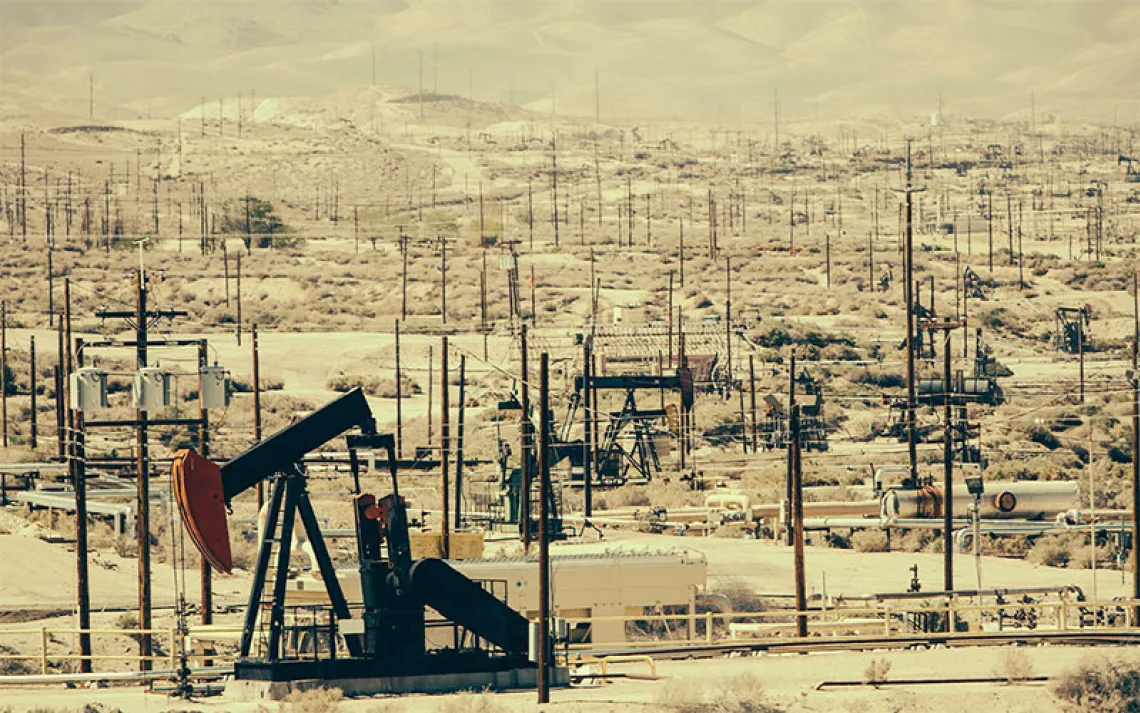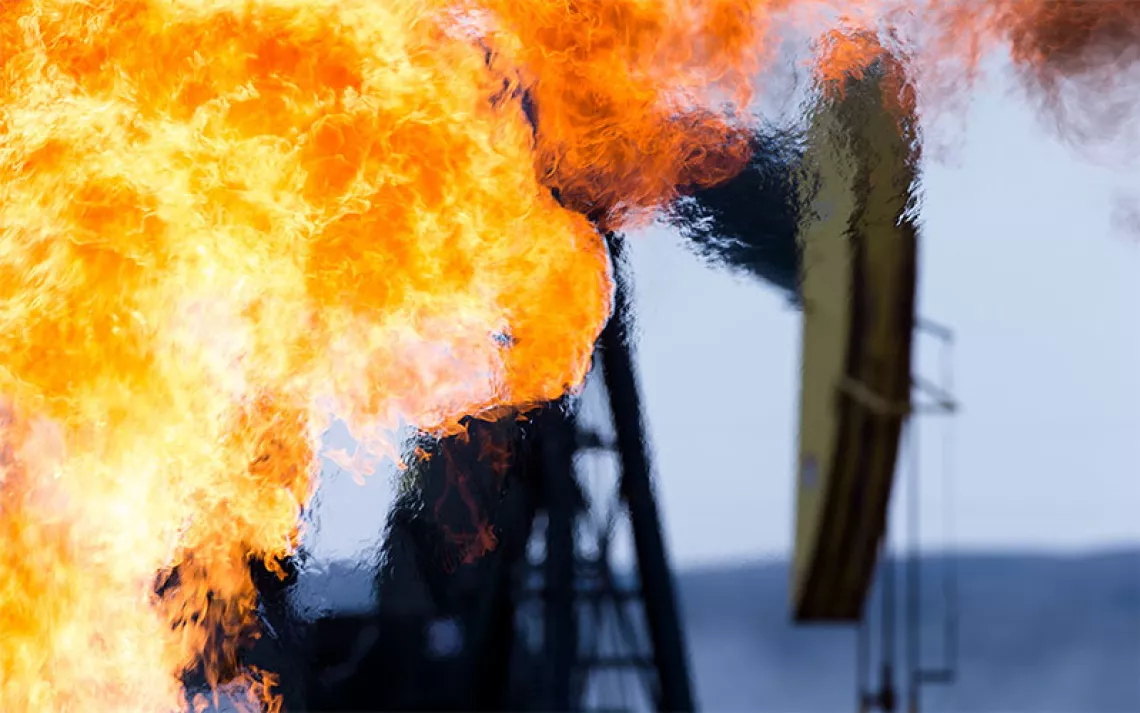The Verdict Is In: A Livable Planet Trumps Corporate Profits
Dutch court orders Shell Oil to slash its climate pollution

Photo by Karol Serewis / SOPA Images / SIPA USA via AP Images
This week a Dutch court made history as it ruled that the human right to a livable planet takes precedence over a fossil fuel corporation's profit motive.
Ruling in a case brought by Greenpeace and Friends of the Earth Netherlands along with 17,000 other co-plaintiffs, Judge Larisa Alwin found that fossil fuel giant Shell Oil has known “for a long time” about the damage caused by its greenhouse gas emissions and said that the company’s current operations violate human right protections guaranteed by the European Convention. Writing with razor-sharp moral clarity, Judge Alwin concluded, “The interests served with the [emissions] reduction obligations outweigh Shell Group’s commercial interests.”
In a video posted to announce the verdict, a court spokesperson, Jeannette Honée, said the court in the Hague acknowledges that “the consequences could be big for Shell.” Nevertheless, “the court believes that the consequences of severe climate change are more important than Shell’s interests.… Severe climate change has consequences for human rights, including the right to life. And the court thinks that companies, among them Shell, have to respect those rights.”
While the Dutch court found that Shell has not acted unlawfully, it concluded that the company is still bound to uphold “an unwritten standard of care” to meet the emissions reductions obligations of the Paris Agreement and a responsibility to do what it can to help prevent “dangerous climate change.” The judge also agreed with the plaintiffs that the oil and gas major is obligated to act in accordance with Article 2 of the European Convention, which guarantees the right to life, and Article 8, which guarantees the right to family life.
Judge Alvin ordered Shell to “at once” slash all of its greenhouse gas emissions—including those of the multinational corporation's many subsidiaries. Shell is supposed to cut its total global carbon pollution by 45 percent by the end of 2030, compared with a 2019 baseline. That court-ordered mandate will more than double the emissions reductions the corporation was already planning on making. Earlier this year, Shell promised to reach net-zero emissions by 2050 and to reduce the carbon intensity of its products by 20 percent by 2030. According to researchers at the Climate Accountability Institute, Shell was the world’s seventh-biggest greenhouse gas polluter between 1965 and 2018.
While Shell described the decision as “disappointing,” climate advocates erupted in celebration, noting that this is the only time an oil company has been held legally accountable for fueling climate change. On Twitter, Greta Thunberg called the verdict “a game changer.” In a statement, Carroll Muffett, president of the Center for International Environmental Law, described the ruling as “a watershed for the oil and gas industry. The court’s ruling … recognizes that Shell not only has the capacity, but the responsibility to bring its operations into line with what the science shows is necessary to prevent catastrophic climate change.”
Climate law experts agreed that the ruling from the Hague could, if upheld, be a landmark decision. “I think it’s quite significant,” Michael Gerrard, the founder and faculty director of the Sabin Center for Climate Change Law at Columbia University, told Sierra. “It’s the first time that a court has held a fossil fuel company or greenhouse gas emitter generally liable for climate change impacts.” Gerrard continued, “I think one of the very significant parts of it is that it’s not only their [Shell’s] direct emissions, but it’s also the full supply chain, so upstream and downstream, including their customers.”
Environmentalists’ victory in the Hague is likely to invigorate legal efforts in other countries to hold the major oil, gas, and coal companies responsible for their unique role in sparking and exacerbating the climate crisis. In the United States, some 20 cities, counties, and states are seeking to recover climate-related damages from the oil and gas giants. In Germany, the utility RWE is trying to fend off a lawsuit from a Peruvian farmer alleging harms from the utility’s operations. A Polish utility, Enea, is the target of a lawsuit filed by a British corporate accountability group. And Shell is also facing scrutiny in the United Kingdom, where pension funds have threatened to sue the company.
No matter the country or jurisdiction, the major carbon polluters have sought to bat away these legal challenges by arguing that the courts are an imperfect venue for settling an issue as huge as global climate change. The carbon polluters also try to wave off responsibility by claiming that they are merely satisfying people’s demands for energy. Karen Sokol, a law professor at Loyola University of New Orleans who has followed the climate tort cases closely, says that the ruling from the Hague is a sign that some judges are becoming increasingly comfortable with tackling the new legal questions raised by the climate crisis.
“What’s interesting about this decision, for anyone who cares about the climate, is that the court looked carefully at the obligations under the Paris Agreement, and applied that to a multinational company, and did that through the laws of the Netherlands,” Sokol told Sierra. “In that sense, this ruling is an example of courts getting more comfortable in dealing with climate science—which is an important part of our society—and recognizing that as judicial fact.… The court didn’t bat an eye in looking at Shell’s [emissions reduction] pledges and saying, ‘This falls way too short. It’s based on a bunch of conditions, not promises.’”
Shell has already stated its intentions to appeal the ruling from the district court. The case will now head to the Dutch appellate courts and may very likely end up at the Dutch Supreme Court—a process that could take at least a year. While Judge Alvin’s verdict may be sweeping, it’s not yet final.
And still—the importance of this week’s court ruling can’t be overstated. For the better part of 20 years, citizens around the world have marched and rallied and protested to demand that the powers-that-be call a halt to the burning of fossil fuels. From the frigid streets of Copenhagen in 2009 to the historic crowds at the People’s Climate March in Manhattan in 2014 to the globe-spanning climate strikes of fall 2019, some version of the placard “planet before profits” is a constant at climate protests. This week, a tribune of justice finally listened to that people’s cry—and put the power of the law behind the demand for a livable planet.
 The Magazine of The Sierra Club
The Magazine of The Sierra Club



